Intersectional Community Score Card: the accountability tool supporting Kisumu youths to advocate for inclusive healthcare
 11 March 2024
11 March 2024
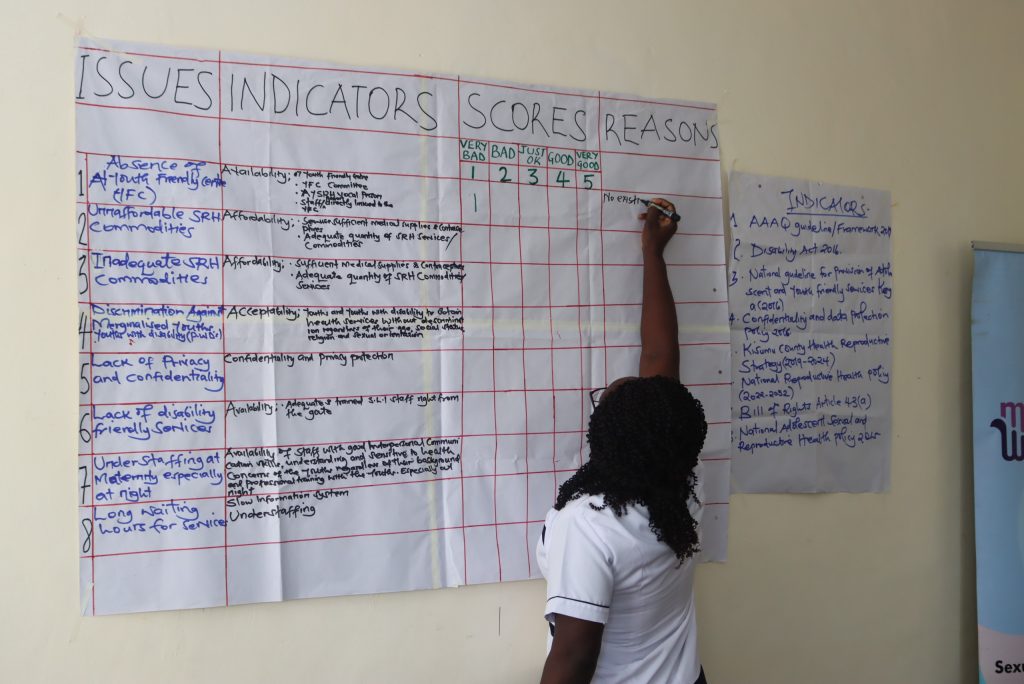
Zaccheus Okoth is a 23 year old in Seme, one of the sub-counties in Kenya’s Kisumu county. When the opportunity to take part in the Make Way programme’s sensitisation drive at a local school presented itself, a curious and active Okoth jumped at it. It is here that he learnt about a social accountability tool that would expand his knowledge on Sexual and Reproductive Health and Rights (SRHR).
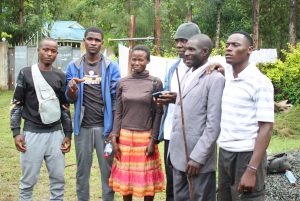
youths with hearing impairment together with the SLI and the policy bearer
Today, the student of Computer Science is an SRHR advocate for fellow youth in the community. Zacchaeus Okoth is a 23-year-old in Seme, one of the sub-counties in Kenya’s Kisumu County. When the opportunity to take part in the Make Way programme’s sensitization drive at a local school presented itself, a curious and active Okoth jumped at it. It is here that he learned about a social accountability tool that would expand his knowledge of Sexual and Reproductive Health and Rights (SRHR). Today, the student of Computer Science is an SRHR advocate for fellow youth in the community.
“Before the programme came to our community, I knew so little about SRHR. Through following the program’s intersectional tool step by step, I have learnt a lot about SRH services. In most learning sessions, they bring a nurse who talks to us about them (services), and demonstrates to us how to use some (contraception) methods.”
Okoth adds that he and others have also been able to directly share feedback with some of the health authorities in his community. “Through this Programme, I have met some ‘big people’ like the director of the hospital in Seme county and shared with him the problems that youth were facing.”
The process
The Intersectional Community Scorecard (ICSC) is the Make Way programme’s social accountability tool that helps youth with compounded vulnerabilities to promote and claim their sexual and reproductive health and rights.
The six-step tool stipulates that processes explicitly prioritize addressing the sexual and reproductive health and rights (SRHR) of minoritized youths, by improving the Availability, Accessibility, Acceptability, and Quality (AAAQ) of SRH services. In implementing this, the processes must also engage the active participation of minority youth in all activities.
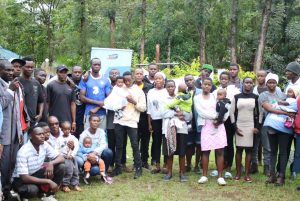
Participants of ICSC process, Muhoroni
Targeted youth participants
In Kisumu’s Muhoroni sub-county, girls and youths with disabilities are the most disproportionately affected. “These have been identified as the most vulnerable groups in this community,” Consolata Otieno, a Reproductive Health Coordinator in Kisumu’s Muhoroni sub-county says. For girls, she attributes this to abject poverty that leaves them susceptible to dropping out of school, and consequently, early marriages and domestic violence. While youths with disabilities lack critical learning resources.
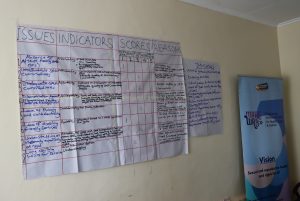
ICSC scored sheet by the health service providers
She adds: “High teenage pregnancies have also been a challenge that comes with dropping out of school. On the other hand, most of the services are not disability friendly. There are few service providers trained in sign language.” For youths with especially learning disabilities, economic barriers are exacerbated by a shortage of personnel equipped with special training, and spaces for safe expression to facilitate access to SRH information.
Intersectional theory, as coined by civil rights scholar Kimberlé Crenshaw, is an understanding that different sets of social identities like race, class, sexuality, etc. overlap to impact access to rights and opportunities.
As part of the Make Way programme’s comprehensive intersectional approach to promoting equitable access to SRHR, Cheshire Disability Services, Kenya (CDSK) opened a ‘Safe Space’ for young women with disabilities in Kisumu. The space provides a prejudice-free environment for the vulnerable group to commune and share their lived experiences through SRHR. It also creates an avenue for peer-to-peer advocacy using the ICSC tool. Safe spaces also boost one’s psycho-social wellness, self-esteem, and dignity for marginalized people who typically experience discrimination and abuse within communities.
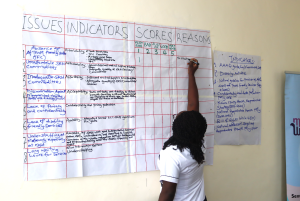
Scoring process at Kombewa Sub County Hospital
The Ministry of Health’s National Reproductive Health Policy, the Government of Kenya’s commitment to upholding SRHR is “anchored on the philosophy of leaving no Kenyan behind on matters of reproductive health…” But the implementation thereof still has a long way to go in terms of inclusivity. Maurice Omosoh, the SRHR duty bearer in Kisumu notes some of those gaps as poor involvement of youths in policymaking and the lack of awareness of the policy. “There is a disconnect (in communication) between the policymakers and youths,” he says.
Browse the Intersectional Community Scorecard tool kit here:
For more information reach out to Cheshire Disability Services, Kenya (CDSK), Irene Ngolo



